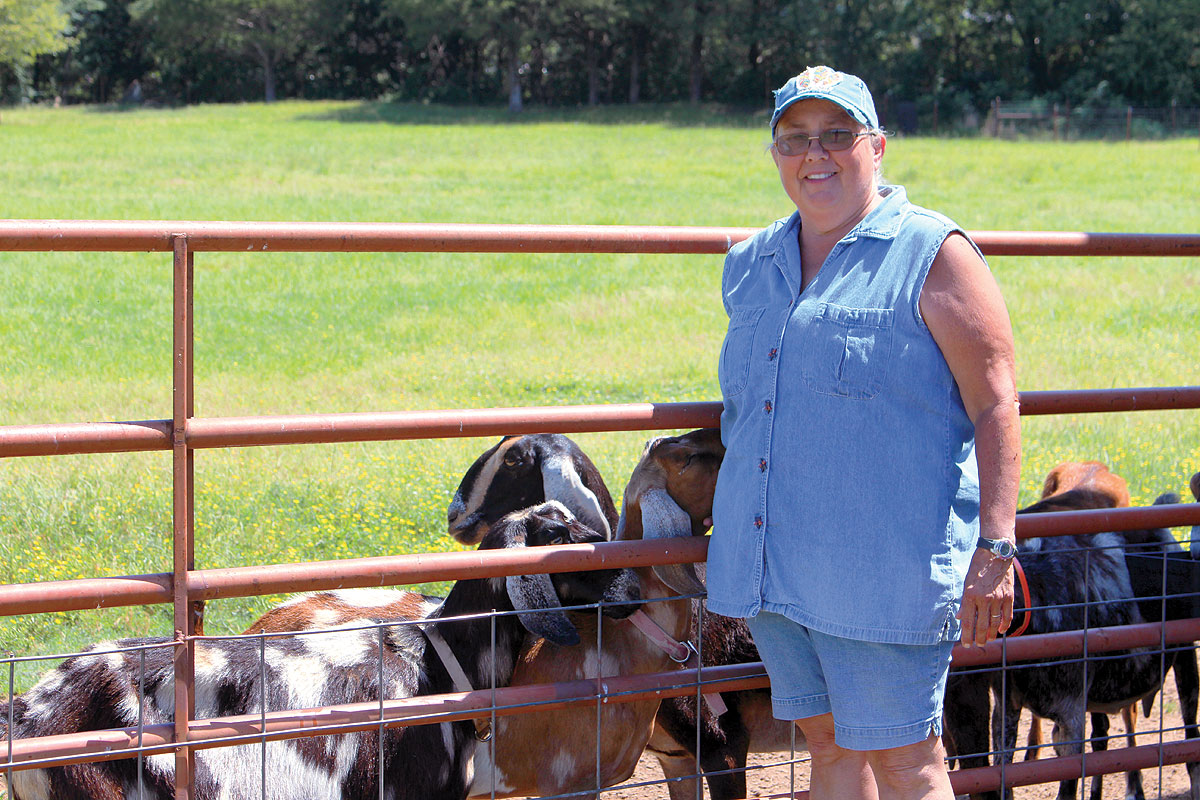
Just west of Altus, Ark., on Pond Creek Road there’s a lush and neat farm called Lois’s Rockin A’s Farm, that is home to Lois Altimus, and a small herd of dairy goats.
Lois started with dairy goats about seven and a half years ago, and today she runs a registered Nubian herd, consisting of eight does, and she utilizes two bucks, a registered Nubian, and a three-quarter Nubian and one-fourth Saanen.
“I chose the Nubians because of their docile personalities and their gentleness. They live to be anywhere from 12 to 13 years old, if well cared for,” Lois said.
Nubian’s may not produce a higher volume of milk, compared to other dairy goat breeds, but the milk they produce is higher in butterfat content.
Lois’ goats each give about a gallon a day, and they are milked only once a day.
Goats lineup at the barn door in the order they are milked, only four at a time on the podium, and they each have their position where they stand and place their heads in a light yoke.
Lois then places the milk can under each one of them and milks them, by hand, as they quietly eat. When she is done they stand until she opens the yoke around their heads they turn and go down the steps and out of the barn and as they leave she gives them an animal cookie.
Lois feeds a specialty ration to her herd that includes five grains, as well as alfalfa pellets.
“They get a little grain when they come in the parlor to milk, but in the off season, when I’m not milking, they get grained more. They are just like dairy cattle; they know where to come and eat. Plus, they get that cookie in the end.”
The quality of the feed and forages provided to the herd is reflected in the quality of the milk, so Lois provides the best possible. She also said well cared for animals also are better producers.
“I take a lot of pride in how I take care of my girls,” she said. “When you milk, you have access to your goats, you see them and can tell if they are in distress, wormy or whatever.”
The philosophy seems to be working well for Lois.
“I have a good clientele. I have repeat customers and some of them as many as six years,” Lois explained. The going rate for milk from the farm is $7 per gallon.
Lois will sell only the freshest milk. Milk that is over three days old is used to make cheeses, including mozzarella, soft cheeses and a brick cheese.
Unfortunately, Arkansas’ raw milk laws will not allow Lois to sell her cheeses, but she does share with her family and friends.
While there is a demand for her goats’ milk, the market is seasonal.
Bucks are left with does throughout the month of September, then pulled.
“I normally will stop milking around October because the girls will be pregnant by then and they usually start drying off themselves,” Lois explained. “Once they start having babies, I’ll start milking again.”
Kids are left on their mothers for about two months, then weaned. Lois feels leaving the kids on their mothers helps build their immune system, and prevents other problems.
“I have learned that if you bottle feed kids, CAE (Caprine Arthritic Encephalitis) can happen,” Lois said. “I also start milking every morning, two weeks after birth. I wean the babies off of the moms at about 2 months age.”
Kids are sold at 3 to 4 months of age. Doelings from Lois’ herd typically sell for $300, and bucklings for about $150.
Lois’ goal is to someday have 10 does, but she won’t allow just any animal on her farm.
“I keep a closed herd,” Lois said. “The Nubians are very susceptible to parasites if you don’t keep their immunity up the worms will take over, and you can start to lose them very quickly. I feed them only good feed, and good hay. I also don’t feed them on the ground. I put salt mineral blocks formulated just for goats out for them also.”






